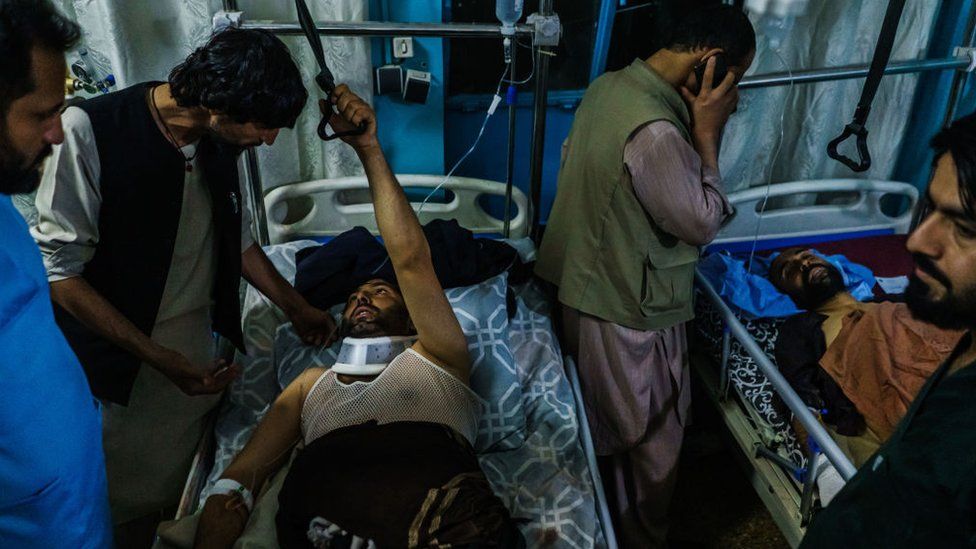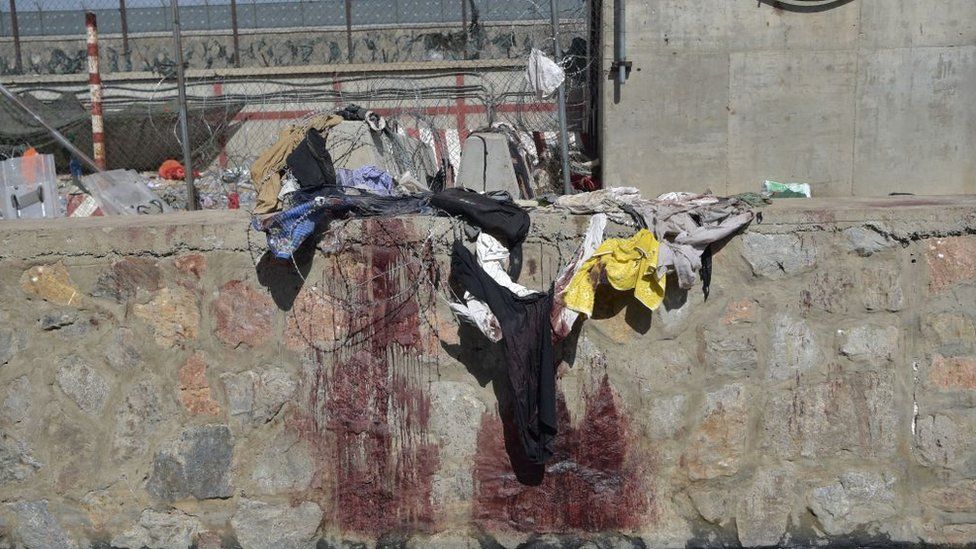Tail Bites Dog
"We are worried about these sticky bombs that once we used to apply to target our enemies in Kabul.""We are concerned about our leadership as they could target them if not controlled them successfully.""Their main structure is broken and they are now divided in small groups to carry out attacks."Taliban intelligence official"In Afghanistan, the return of Taliban is a huge victory for the Islamists.""They have celebrated the return of the Taliban, so I think that Afghanistan is the new theatre."Rohan Gunaratna, professor of security studies, Nanyang Technological University, Singapore"If the [Islamic State in Khorisan] is true, China's concerns about terrorism in [Afghanistan] -- to which the Taliban claims to be receptive -- will increase."Michael Kugelman, deputy director, Asia Program, Wilson Center
 |
| A
screen grab shows an emergency vehicle as people arrive at a hospital
after an attack at Kabul airport, in Kabul, Afghanistan August 26, 2021.
REUTERS TV/via REUTERS |
Of both terrorist groups, the Taliban now has an air of legitimacy as it fumbles in its attempts to officially administer its newborn territory the Islamist Emirate of Afghanistan. It has returned to slightly modified methods of its former administration of the country but at present it has company. Since its last administration a local version of Islamic State has ensconced itself alongside al-Qaeda, as a far more severely fundamentalist version of Islamic sharia which scorns the Taliban as nothing more but a pale imitation of the Western-backed government it shoved aside.
The Taliban has its Emirate restored, the Islamic State is determined to restore its sundered Caliphate, and Afghanistan is just as good a place to start as any. All the violent tricks that the Taliban pioneered in terrorizing the country are now in the hands of the IS-K who have sent their trademark suicide bombers on bloody missions to ensure their message is received. From bombing the Kabul airport as U.S. troops were departing and Afghans desperately awaited airlift out, to a more recent bombing of a Shiite mosque killing 100 and injuring hundreds more.
In new negotiations with the U.S. taking place in Doha, Qatar, senior Taliban officials have made it clear they are not interested in the American offer to give them aid in opposing the presence of IS-K terrorists, insisting they are more than capable of handling the group themselves. They have, after all, had ample experience in their two decades of IEDing foreign troops and meeting their conventional military presence with guerrilla tactics.
What does concern the Taliban is the potential for their leaders to be targeted with 'sticky bombs' adhering to the underside of vehicles, just as they themselves once used that tactic among many others to annihilate Afghanistan's government officials and Western interlopers. Pakistan has become another interlocutor, trying to lure the U.S. to engage with the new rulers of the country; above all to release billions in international funds to allow the Taliban to get on with rebuilding what they've destroyed.
After Friday's attack at a mosque in Kunduz, the IS affiliate identified the bomber as a Uyghur Muslim who targeted both Shiites and the Taliban in response to their agreement to expel Uyghurs to please China. The prediction is that more such attacks will be in the offing, challenging the Taliban's efforts to build relations with its neighbours, specifically China. Most Uyghur militants are part of the border regions of Pakistan and Afghanistan, belonging to the East Turkestan Islamic Movement.
There are mounting threats from the Islamic State affiliate in the wake of the Kunduz attack, and Afghans who had fled the Talibans' takeover in August, living in tents are now vulnerable. Up to 1.3 million Afghans were displaced in past wars. The Taliban have mounted returns of displaced families. Some to return to Kunduz. "At least there we have four walls" said one Afghan woman. "Winter is on the way. There is no firewood. We need water and food."
 |
| IS-K claimed responsibility for the deadly attack outside Kabul airport on 26 August Getty Images |
Labels: Afghanistan, Islamic Emirate of Afghanistan, Islamic State, Taliban, Terrorism Centralt

<< Home